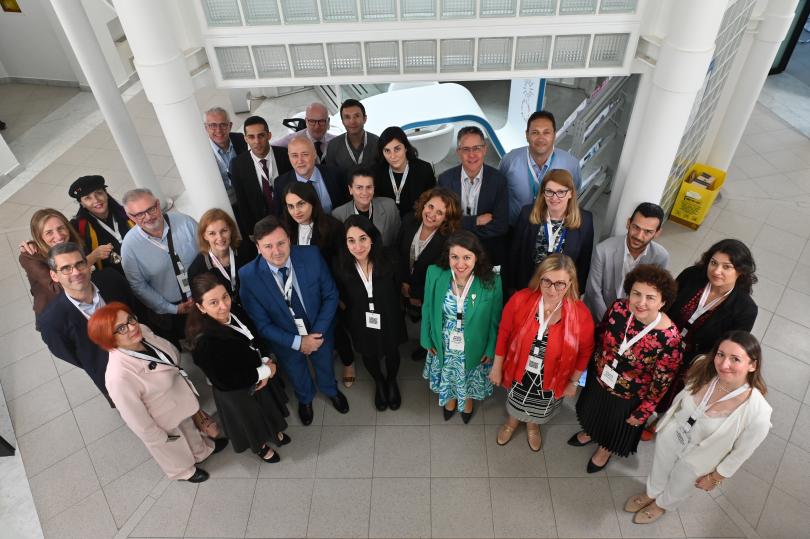
Partnership, monitoring, and human-centric approach critical for vocational education success
Osnabrück Declaration peer learning event in Turin
The ETF and Turin have been the host of an international peer learning event as part of the Osnabrück Declaration monitoring exercise on the vocational education and training (VET) sector in EU candidate countries. The event took place 27 -28 May.
Opening the event, the ETF’s Director, Pilvi Torsti, drew attention to the role of VET to help individuals and societies adapt and benefit from the digital and green transitions.
“Partnership of VET institutions with employers and trade unions is a fundamental component in fulfilling the Declaration's objectives for growth, innovation and inclusion,” said Torsti.
During the event, Directors General for VET (DGVT) from EU member states and members of the European Commission’s Advisory Committee on Vocational Training (ACVT), which includes representatives from EU candidate and ETF partner countries together with national and international experts exchanged knowledge on VET sector developments and monitoring experience towards achieving set goals.
Topics included how to make VET agile, flexible, innovative and attractive, by mobilising various digitally-oriented strategies and solutions, such as integrating digital skills and competences in VET curricula and programmes; diversifying modes of learning through digital and/or blended learning; supporting teachers and trainers’ professional development for and through digital solutions; and modernising infrastructure of VET provision.
The importance of data and evidence
The Osnabrück process supports the Council Recommendation on VET for sustainable competitiveness, social fairness and resilience. It is an important component of the ETF’s intelligence building to which a specific session of the programme was dedicated.
“Gathering and using relevant, quality and timely data and evidence on the VET sector and policy developments in ETF partner countries is vital for the ETF’s policy advice support to countries and EU programming activities in the neighbouring regions,” said Mihaylo Milovanovitch, ETF senior expert and coordinator of evidence and data gathering.
The first monitoring results of 2023 policy developments for the EU partner countries were presented and discussed as part of a self-reflection exercise about each country’s experience in the Osnabrück process in preparation for the next policy cycle to be monitored post-2025.
Vocational education rising from the ashes: Piazza dei Mestieri
A site visit to Piazza dei Mestieri, a secondary trade school in Turin, Italy, provided inspiration on the power of VET, and how setting goals with key partners and measuring the progress towards them can transform its impact.
The impetus for the creation of Piazza dei Mestieri rose from the ashes of a flaw in the system according to Mauro Battuello, Director, Piazza dei Mestieri. It was founded two decades ago and receives support from a myriad of sources: the public sector (from the Turin City Hall to the European Union), corporate sponsorships, and the profits from on-campus businesses. Built on the site of an old tannery its goal has been to address the needs of early high school leavers. The campus includes a restaurant, brewpub, pastry shop, and graphic-design-and-print shop. The businesses are run by professionals, but 900 students between the ages of 14 and 18 rotate on working shifts to learn from professional masters.
When Piazza dei Mestieri students are not busy in one of the commercial establishments, they combine normal classroom work with labs on hairstyling, the culinary arts or pastry making. Some exchange these activities for paid apprenticeships with outside firms as they approach graduation. Digital technology is an important part of all disciplines and training.
Battuello emphasised the human approach central to the schools' ethos.
“We work for young people so they can learn to master their chosen profession, and that includes digital tools – rather than being mastered by them,” he concluded.
Background
The Osnabrück Declaration was officially adopted in November 2020. It supports the EU's Council recommendation on vocational education and training for sustainable competitiveness, social fairness and resilience. Digital skills development and digital inclusion is an integral component. It focuses on four main areas:
- resilience and excellence through quality, inclusive and flexible VET;
- establishing a new lifelong learning culture – relevance of continuing VET and digitalisation;
- sustainability – a green link in VET;
- European education and training area and the international dimension of VET.
The ETF supports the monitoring and implementation of actions of the Osnabrück Declaration in EU candidate countries working closely with its sister agency Cedefop which supports implementation and undertakes monitoring in EU member states. Both agencies report annually to the EU's institutions.
Did you like this article? If you would like to be notified when new content like this is published, subscribe to receive our email alerts.